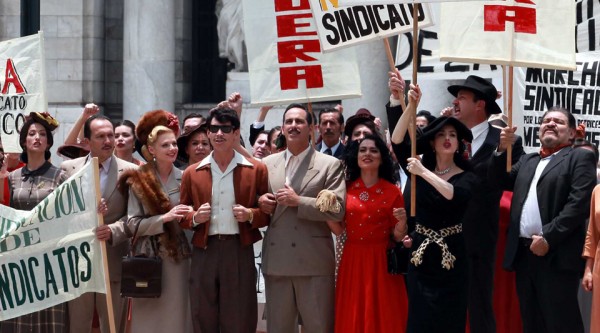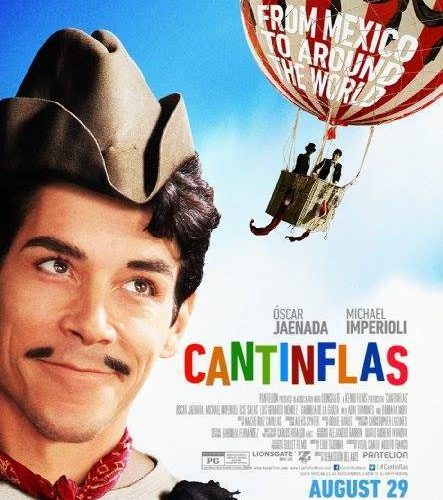While mostly delightful, yet not terribly insightful, Cantinflas is a warm and nostalgic look at the business of show, including one instance where the Golden Age of Mexican cinema met Hollywood. The problem is Cantinflas, directed by Sebastian del Amo and intended as a matter of national pride mostly for a Mexican audience, is less a psychological portrait and more of sketch of major life events of Mario Moreno. The source of conflict within the film is almost always related to business, while del Amo’s lens is focused mostly on Monero’s (aka Cantinflas) public life and events documented.
The biopic is a tricky animal and Cantinflas mostly plays it straight — it’s exactly what its subject represents: movie magic. While darker dramatic turns persist late in the film’s third act as his marriage breaks up, the film’s non-linear structure cuts between “present day” (Hollywood circa 1955) and biographical information as Cantinflas (Oscar Jaenada) leaves his neighborhood of Tepito for Mexico City. A born performer, he rises to prominence with the aid of financier Jacques Gelman, who bankrolls Cantinflas’ pictures, offering him and his collaborators total financial freedom.

Switching between the past and “present,” Cantinflas’ rise to power is juxtaposed against the desperate attempts of producer Michael Todd to get his picture Around the World in 80 Days off the ground. Lavishing in development hell at United Artists — a studio founded via a chance encounter with Charlie Chaplin to exist outside of the studio system — the indie has become just as bureaucratic as the others. Todd (Michael Imperioli) first courts Elizabeth Taylor with the hope of hyping Around the World at a press conference with an all-star cast. Amongst the holdouts is Cantinflas, requiring Todd to personally visit Mexico in the hopes of wooing him with a supporting roll. Fascinating and never explored (perhaps because it would add violence to an otherwise sunny portrait), he’s invited to a bullfight where Cantinflas performs, a detail that would have added some much needed richness, if not played for a bizarre laugh.
As far as biopics go Cantinflas takes a subject that is perhaps better known amongst the film’s Mexican audience members and glosses over the interesting parts of his life. Sure, he’s instrumental in building a Mexican film industry and has the ability to say no to Hollywood (he certainly doesn’t need UA’s money as a later twist reveals) but we can learn these kinds of facts via his Wikipedia page. While Amo has crafted, in some ways, a cinematically portrait cloaked in the “magic of the movies,” its charm is also its flaw — I’m not sure one can have it both ways.
Like the recent James Brown biopic Get On Up, Cantinflas is perhaps too tame and apolitical despite recognizing some of the politics intrinsically linked to the life and times of their subjects. While an over-the-top psychedelic Oliver Stone rendering of Cantinflas’ life and times would have been inappropriate, as a biopic, this portrait feels like its just scratching the surface of an important cultural figure. As light entertainment it satisfies, however this feature feels like a biopic of Cantinflas verses the definitive biopic, racing through biography highlights without slowing down to focus on individual relationships that were critical to his life and career.
Cantinflas is now playing nationwide.

